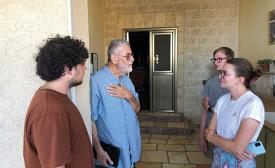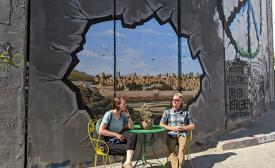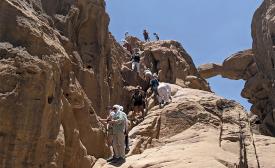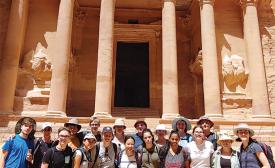Zollikon church
For a few brief months in spring 1525, the first Anabaptist congregation flickered to life in this house in Zollikon, a village on the edge of Zurich, Switzerland.
For a few brief months in spring 1525, the first Anabaptist congregation flickered to life in this house in Zollikon, a village on the edge of Zurich, Switzerland.
This summer, I attended two family reunions separated by one week. The Olferts, my paternal family, gathered at Pike Lake for several days, while the Warkentins, the maternal side, met a week later at Shekinah, a church camp near my home.
Faith and imagination go hand in hand. Addressing climate change decidedly requires both. Can Christians imagine a different world that takes better care of creation and all human brothers and sisters?
Sometimes I wish God would indisputably appear in some fantastically obvious way, eliminating my wrestling, struggling and doubt.
The second event in a series of online discussions that Canadian Mennonite is hosting will take place on Zoom on Wednesday, Oct. 5 at 8 p.m. ET.
Hosted by Aaron Epp, CM’s online media manager, the discussion will explore Indigenous-settler relations and some of the concrete steps Canadian Mennonites are taking to further reconciliation.
On July 30, my brother was getting married in Williston, N.D., and I was the officiant. It was a lovely celebration, with little kids taking over the dance floor at the reception, and I’m delighted to have my brother’s partner join the family.
Sara Garnet and I were cleaning out the Sunday school classrooms of Faith Mennonite Church in Leamington, Ont., with heavy hearts one Wednesday afternoon. We had put it off for a long time. It felt like we were cleaning out a home after a death had taken place.
Point: Teachers are fallible, but God can use them
Over the past decades, as a “dyed-in-the-wool” Anabaptist Mennonite, I have come to value the teaching/preaching of several “new Anabaptists.”
“Called to proclaim good news to the poor . . . release to the captives . . . sight to the blind . . . freedom for the oppressed . . . and the time of the Lord’s favour” (Luke 4:18-19).
Practices of Jubilee are particularly relevant today when we consider this new season of being church.
“All beginnings are hard” said J.J. Thiessen. He began his public ministry in 1930 in Saskatoon, hired by the General Conference Mennonite Church to operate the Maedchenheim, helping young women find work and providing spiritual guidance, and to give leadership to the emerging congregation in Saskatoon.
It’s a summer of church gatherings. It’s a summer of truth-telling about the devastating impact of colonization by the church. It’s a summer of reflection on what it means to be a post-colonial church.
“Dear friends, we’re one in Jesus’ love, restored to hope, so trust him fully, he’s the Lord who calls us friends.” Voices Together’s No. 525, is a simple and lilting Laotian traditional melody, with lyrics that describe Jesus’ followers as friends.
A couple weeks ago, I came across this verse in I Samuel 18: “David continued to succeed in everything he did, for the Lord was with him.”
When I was a young adult volunteer in Jamaica, part of Mennonite Central Committee’s Serving and Learning Together (SALT) program, I brought a pie to a Mennonite church-sponsored baking competition and was disqualified because my mango pie did not fit the unstated criteria of being a sweet pot
The idea that Christ will return someday “riding on a horse, galloping through town and lopping off heads, is a blatant misreading of what is going on here,” writes Jeremy Duncan about the book of Revelation. He argues that this final book of the New Testament must be read through the lens of Jesus as portrayed in the gospels.
In early July, I was in Indonesia—virtually. Like approximately 800 other Anabaptists around the world, I registered as an online participant of Indonesia 2022, the 17th assembly of Mennonite World Conference (MWC).
A ‘sad day’ for Indigenous-Settler Relations
Re: “Indigenous relations work revamped, reduced,” May 30, page 14.
Bought tires for my pickup and determined to install them myself. I no longer have the specific equipment, so tire work involves scrabbling on a concrete floor with hammer and pry bars.
When I moved from Alberta last year, my explorations of Ontario began by bike. My cycling companions showed me things I had not heard of. Once, we biked past the towering statue of some military guy on the heights above the town of Queenston. Just a day earlier, we had cycled around another part of the Niagara Region and found a historical marker about a “negro burial ground.” Such wording!
The camping trip had a rough start. While packing to go we got a phone call with a heart-stopping estimate for our car repairs, the first of two vehicles needing work. We were definitely feeling the financial crunch.
Sometimes it is just best for the previous person to get out of here and let the new person start with a clean slate. Some say that pastors and denominational leaders should just give a month or two notice and then leave, and sometimes this may be what is best.

Hannah Kroeker and Fiona Janzen ride camels in the Wadi Rum. (Photo courtesy of Westgate Mennonite Collegiate)

Westgate students engage with Ben, an Israeli man who spoke about losing his daughter in the conflict. He is part of the Family Forum, a group that connects bereaved Israeli and Palestinian parents. (Photo courtesy of Westgate Mennonite Collegiate)

Raya Cornelsen and James Friesen sit by the separation barrier in Bethlehem, just outside of Banksy's Walled Off Hotel. (Photo courtesy of Westgate Mennonite Collegiate)

Students scramble up to the Burdah rock bridge with their Bedouin guides. (Photo courtesy of Westgate Mennonite Collegiate)

Raya Cornelsen and Nancy Loewen overlooking the treasury in Petra. (Photo courtesy of Westgate Mennonite Collegiate)

The Westgate students pose in front of the treasury at Petra. (Photo courtesy of Westgate Mennonite Collegiate)

Westgate students meet with the young people who are a part of the Galilee Dreamers. (Photo courtesy of Westgate Mennonite Collegiate)

Westgate students eat at the Fauzi Azar Hotel in Nazareth. (Photo courtesy of Westgate Mennonite Collegiate)
After two years of living through a pandemic, we never expected that we would be able to travel to the Middle East. After so much uncertainty, we were so fortunate to be able to be a group of 15 graduating Grade 12 students visiting Israel/Palestine and Jordan.
Keep on keeping on
After many years of supporting the withholding of military taxes and volunteering with Conscience Canada Peace Tax Trust Fund (CC), I have at last retired from the board.
We have not yet achieved our goal: that it be legal in Canada for conscientious objectors (COs) to war to have their military taxes go towards peace-building purposes.
When God’s story connects with our story, the Holy Spirit is at work, bringing life. As author Anne Lamott says, “I do not at all understand the mystery of grace—only that it meets us where we are but doesn’t leave us where it found us.”
A large audience gathered for one of two “Women’s Section” meetings at the Mennonite World Conference held in Kitchener, Ont., in 1962. The women met to consider the conference theme, “The Lordship of Christ,” from the perspective of personal faith and the home.